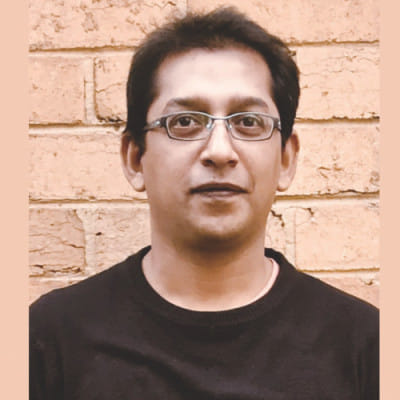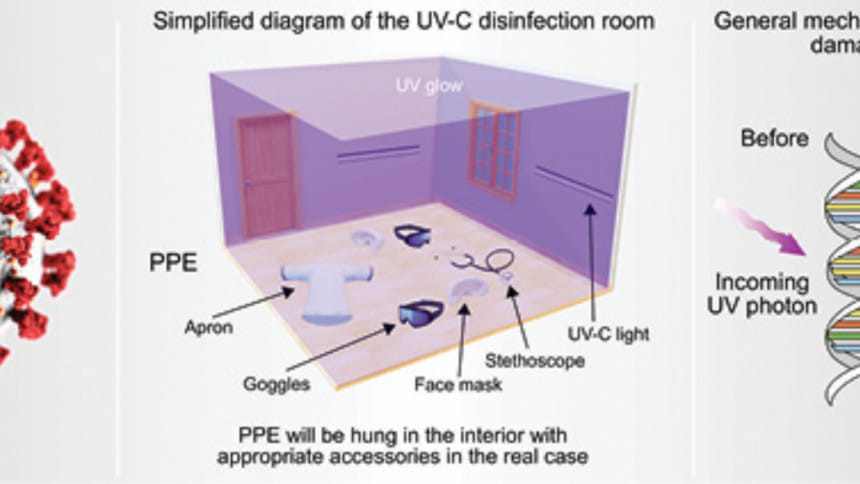UV hope for PPE

With coronavirus seemingly unstoppable, global powers are in a rush to stock quality PPE (personal protective equipment).
And if it is posing such a strain on the world's best healthcare systems, the potential pressure on Bangladesh's hospitals is understood to be catastrophic. The deaths of Dr Moyeen Uddin and dozens others from Covid-19 have already sent chills down the spine of medical service providers.
Amid this grim situation, a Bangladeshi-Australian chemical engineer has come up with a mission to equip Bangladeshi hospitals with germicidal ultraviolet radiation (known as UV-C) facilities to rapidly sterilise PPE, allowing its repeated use.
Dr Md Arifur Rahim has assembled a committee in Dhaka whose members are desperately meeting with officials, in an attempt to have the ultraviolet disinfectant facilities approved for usage. The project has already been given the green light by the government's health authorities at what Rahim says was unprecedented in speed. The challenge is now to have it taken up by individual hospitals.

One of the committee members, Dr Mahmudul Faisal Al Ameen is a computer scientist based in Japan attempting to help with the project. Last week, he met with administrators at Sir Salimullah Medical College Hospital to allow for a testing of the facilities, as part of a pilot project with several other hospitals in Dhaka. If the trial proves successful in sterilising the necessary PPE, there is potential for the UV facilities to be rolled out across major hospitals throughout the country.
"We are very excited for this project to be successful," says Rahim, "but we cannot do without the help of the authorities and we need volunteers to come forward leaving the panic aside."
The sheer scale of the PPE required if there was a surge in coronavirus patients would be impossible to handle. But many lives may potentially be saved if the currently available PPEs could be sterilised rapidly and re-utilised.
This practice is already going on in many other parts of the world. In China, entire buses are being lit up by the UV light at night in order to disinfect them. Robots are emitting UV light to clean hospital floors and even banks are using them to sterilise money.
The UV light scrambles the genetic material of viruses and bacteria rendering them dead. While there aren't yet any definitive studies proving its effectiveness against Covid-19, it has been used with success against SARS, which is another type of coronavirus.
The much-publicised death of a British-Bangladeshi doctor, Dr Abdul Mabud Chowdhury, in East London shocked the expatriate community to their core. In the week prior to his death, following Covid-19 complications, he wrote on his Facebook page about the challenges of having adequate PPE, something outlined proudly by his son during a BBC interview the day after his passing.
And, the mission of Rahim is a part of many Bangladeshi diaspora initiatives to help the citizens of their motherland in dealing with the pandemic.
Nazneen Sultana, a Boston-based Bangladeshi student, raised tens of thousands of dollars to donate PPE. Sultana coordinated with a garment company in Bangladesh that can make a set of PPE for $4.
Texas-based academic Shafquat Raffee is coordinating food relief efforts of rice, lentils and orange and has posted video of his planned deliveries on social media.
"This is what a large number of people in countries like Bangladesh consume on a daily basis. The absolute poor people really don't eat a lot and they don't have the luxury to eat varieties of food," Raffee told Al Jazeera, "We, the privileged ones can help them get these in this time of crisis."
Meanwhile, the Federation of Bangladeshi Medical Associations, a national representative body for Bangladeshi doctors based in Australia, has raised tens of thousands of dollars, through a social media campaign, to be distributed by lung specialists in Bangladesh. Led by gastroenterologist Dr Ayaz Chowdhury, who has spoken to several of his classmates from Bangladesh working in Covid-19 hotspots around the world, they hope to continue to raise funds for further projects.
Just as the epicentre of the pandemic has shifted to New York, many Bangladeshis have died, especially given one of the worst affected areas was the region of Queens where there is a large community of expatriates.
The lack of PPE is causing a great strain around the world, changing the relationship healthcare workers have with their patients, colleagues and families. Fears are growing among the global communities that there may be an even bigger calamity if active cases continue to skyrocket in Bangladesh.
Rahim hopes his programme exploiting the cheap technology of UV light can help save many lives.

 For all latest news, follow The Daily Star's Google News channel.
For all latest news, follow The Daily Star's Google News channel. 



Comments